According to USDA Labor and Statistics, minorities make up about 9% of the jobs in the agricultural and biological sciences (Bailey et al., 2017; Horst and Marion, 2019). With the ethnic population in the U.S. expected to double in the next 40 years, our workforce needs to reflect the diversity, values, and contributions of people from various ethnicities and cultures (Vespa et al., 2018). As interest in regenerative agriculture and soil health grows, growing an agricultural workforce and leadership with experience in soil health and a variety of cultural work settings is vital for greater adoption of soil health practices among U.S. farmers.
In an effort to increase diversity in agriculture and provide opportunities for minority students to develop skills that will assist them in their career choice, the Soil Health Institute’s Diversity, Equity, and Inclusion Internship Program is geared toward students at Historically Black Colleges and Universities, Native American Organizations and Hispanic Student Associations to improve access and opportunity and provide real world experiences for minority students. We realize that exposing students early in their academic careers to professional working environments in agriculture is one way to expand a student’s global view in a deliberate way. This internship program contributes to SHI’s goals by allowing students to work alongside an expert team of scientists to assist in catalyzing soil regeneration through scientific discovery, and by engaging farmers about the benefits of regenerative soil health systems.
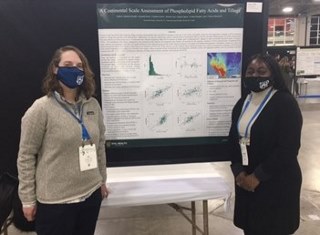
In 2021, SHI recruited three undergraduate students from Prairie View A&M University (PVAMU) and University of Arkansas at Pine Bluff (UAPB) to participate in all aspects of experimental research including sampling, lab analysis, data preparation, and scientific communication.(https://soilhealthinstitute.org/news-events/the-soil-health-institute-welcomes-new-scientists-and-interns-to-its-growing-team/) This past summer the internship began with a one- to three-week field experience, during which interns worked alongside Dr. Vance Almquist, SHI Project Scientist, and Dr. Nate Looker, SHI Research Soil Scientist, to collect soil samples for establishment of Soil Health Benchmarks. This in-field experience gave SHI interns the opportunity to discuss the benefits and challenges of adopting soil health management systems with farmers across diverse geographies.
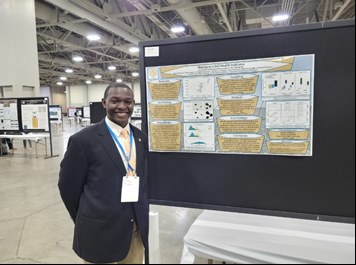
According to USDA Labor and Statistics, minorities make up about 9% of the jobs in the agricultural and biological sciences.
For the rest of the summer, each intern pursued a different aspect of soil health through an independent project. Quanteria Randle, a sophomore in Biology at PVAMU, worked with Dr. Liz Rieke, SHI Soil Microbiome Scientist, to analyze trends in phospholipid fatty acids across climate gradients and management systems. She also combined her artistic and scientific interests in soil by learning to paint with soils that she collected while in the field. Brent Thomas, a junior in Agricultural Engineering at UAPB, developed strategies for farmer outreach, including an assessment of barriers to adoption of soil health management systems. And Robert Thomas, a sophomore in Agricultural Science at PVAMU, led a study on the repeatability of slaking measurements as a soil health indicator, to which the other interns also contributed. At the end of the summer, the interns traveled to SHI headquarters in Morrisville, NC, to present their projects, learn more about SHI’s day-to-day operations, and visit other NC-based institutions developing innovative agricultural solutions.
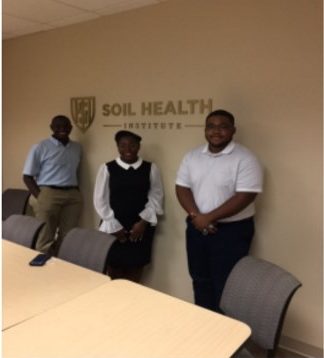
The interns successfully completed independent projects related to their interests and complementary to SHI’s broader Soil Health Benchmarks program. At the conclusion of the internship program, students traveled to the American Society of Agronomy, Crop Science Society of America, and Soil Science Society of America International Annual Meeting in Salt Lake City, Utah to present their research in the form of a poster presentation. Since this experience, Brent, Robert, and Quanteria have set their sights on a career in agriculture.
“Prior to working with SHI, I knew nothing about how important the soil beneath us was. The experience taught me more about it not just on a molecular level, but an artistic level and now I am a proponent of soil health”
Quanteria Randle, SHI Summer Intern
Quanteria, the Biology major from PVAMU, said that “soil was not on her radar until working with SHI”. She now plans to further develop her research on the effects of management on soil microbial communities with the mentorship of Dr. Liz Rieke, SHI Soil Microbiome Scientist, and plans to pursue a graduate degree in a related field. Robert, the Agricultural Science major from PVAMU, had planned to work for another employer prior to his internship with SHI. However, after interacting with different academic, nonprofit, and commercial institutions, he is now exploring a wider range of career opportunities in agriculture while continuing to gain experience in management-relevant research through his work on aggregate stability with Dr. Nate Looker, SHI Research Soil Scientist.
“I couldn’t have imagined how much I would learn working with such amazing people before this summer, not only did I get research experience, but I was exposed to areas of agriculture and professionalism that were completely new to me.”
Robert Thomas, SHI Summer Intern
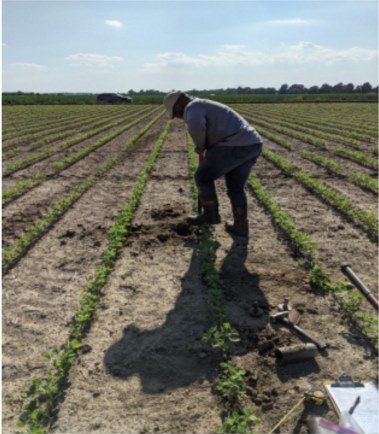
Through this experience, all three interns gained field experience in soil science and learned directly from farmer participants about the benefits and challenges of adopting soil health management systems. These experiences help expose students to examples of professional workplace norms, leadership, and the variety of employment opportunities in science, engineering, and business as applied to agriculture. A new cohort of interns will join SHI in 2022 supported by the U.S. Regenerative Cotton Fund.
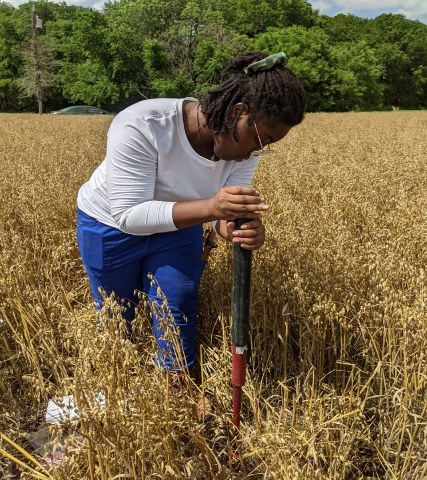
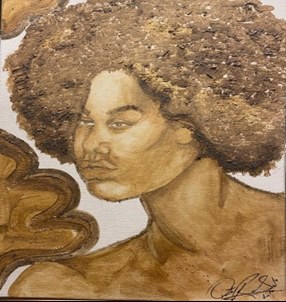
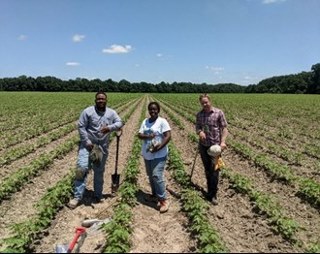
References:
Bailey, Z. D., Krieger, N., Agénor, M., Graves, J., Linos, N., & Bassett, M. T. (2017). Structural racism and health inequities in the USA: evidence and interventions. The Lancet, 389(10077), 1453-1463.
Horst, M., & Marion, A. (2019). Racial, ethnic and gender inequities in farmland ownership and farming in the US. Agriculture and Human Values, 36(1), 1-16.
Vespa, J., Armstrong, D. M., & Medina, L. (2018). Demographic turning points for the United States: Population projections for 2020 to 2060. Washington, DC: US Department of Commerce, Economics and Statistics Administration, US Census Bureau.